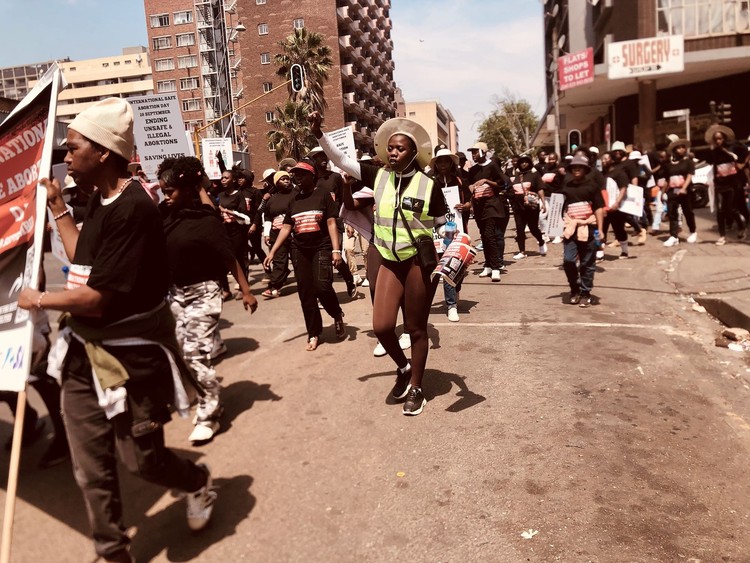Joburg march to raise awareness about access to free, safe abortions
Saturday was International Safe Abortions Day
About 150 young people representing health rights groups marched in central Johannesburg on Saturday to raise awareness about access to safe abortions at state clinics. Photo: Silver Sibiya
About 150 health rights activists marched from Constitutional Hill in central Johannesburg on Saturday on International Safe Abortions Day. They aimed to raise awareness that women can access free, safe abortions at state clinics.
The marchers removed stickers advertising illegal abortions on lamp posts, promising “Safe, quick, clean abortions”. They replaced them with QR signs with “Scan the code for safe abortions”.
Matokgo Makutoane, of Ipas health systems, said, “There should be a crackdown on illegal advertising of illegal abortions … Police must be able to track them down because there are the contact details of these lawbreakers in the adverts.”
He said raising awareness was crucial, since even in countries where abortion is not prohibited, there are “still challenges around accessing safe abortion services”.
Sesona Buyeye, from Ibis Reproductive Health, said in a survey they had conducted of young people aged between 12 and 16, they found the teenagers knew more about illegal abortion services than legal ones.
Simpiwe Masina, who joined the march, said, “Whether it’s private or public, you can go to legal facilities. They must stop using those illegal abortions, because most of the so-called doctors … are not qualified, they’re not trained, they’re using mostly wrong medication, which can lead to death.”
Another marcher, Palesa Makgisa, blamed stigma at free public clinics for the prevalence of illegal abortionists.
“The staff in public clinics can be very judgmental, leading to many of the young girls going to illegal venues, because there they won’t judge you; they just want money. And this can be a life-threatening situation,” she said.
According to the health department, The Choice on Termination of Pregnancy Act gives all women the right to a free abortion at a government hospital or clinic during the first 12 weeks of pregnancy.
From the 13th to 20th week, an abortion may be performed if continued pregnancy poses a risk of injury to the woman’s physical or mental health; there is a substantial risk that the foetus would suffer from a severe physical or mental abnormality; the pregnancy resulted from rape or incest; or the continued pregnancy would significantly affect the social or economic circumstances of the woman.
After the 20th week, a pregnancy may be terminated if the continued pregnancy would endanger the woman’s life; would result in a severe malformation of the foetus; or would pose a risk of injury to the foetus.
Support independent journalism
Donate using Payfast

Next: All night protest at Western Cape Premier’s residence
Previous: Former environment minister Creecy under fire from penguin conservation groups
© 2024 GroundUp. This article is licensed under a Creative Commons Attribution-NoDerivatives 4.0 International License.
You may republish this article, so long as you credit the authors and GroundUp, and do not change the text. Please include a link back to the original article.
We put an invisible pixel in the article so that we can count traffic to republishers. All analytics tools are solely on our servers. We do not give our logs to any third party. Logs are deleted after two weeks. We do not use any IP address identifying information except to count regional traffic. We are solely interested in counting hits, not tracking users. If you republish, please do not delete the invisible pixel.

